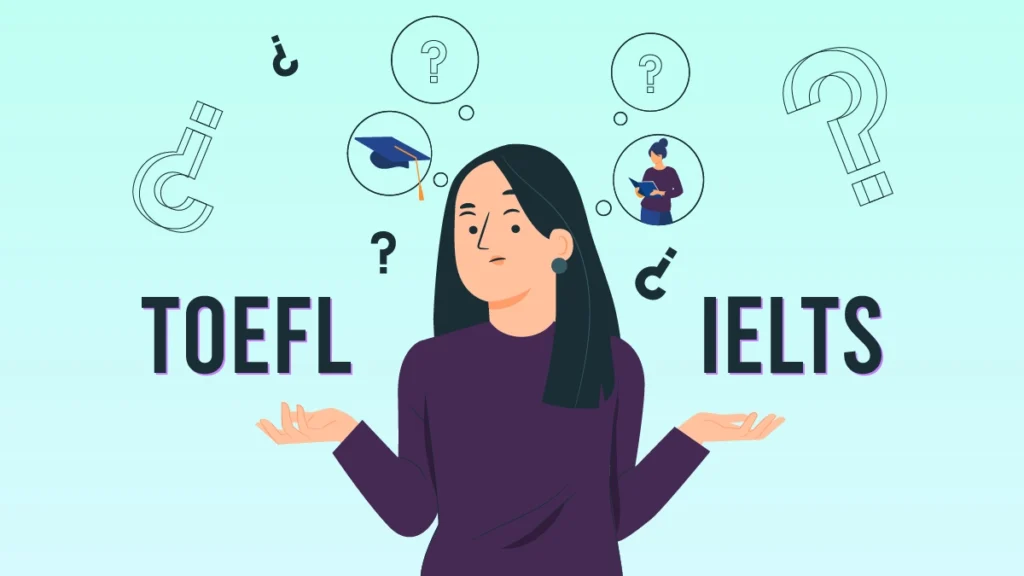IELTS and TOEFL: Differences and Advantages

IELTS and TOEFL: Differences and Advantages
Introduction:
Have you ever wondered which English proficiency test to take: IELTS or TOEFL? Choosing the right test can be a crucial step in achieving your academic and career goals. Both IELTS and TOEFL are widely recognized and accepted, but they differ in format, structure, and focus. This blog will help you understand these differences and guide you in making an informed decision.
IELTS vs. TOEFL: Understanding the Basics
To begin with, let’s break down the fundamental differences between the IELTS (International English Language Testing System) and TOEFL (Test of English as a Foreign Language).
IELTS and TOEFL are both standardized tests of English proficiency, but they differ in format and focus. IELTS offers two types: Academic (for university admissions) and General Training (for immigration and work purposes). It includes sections on Listening, Reading, Writing, and Speaking with a face-to-face speaking component. TOEFL, primarily internet-based, features sections on Reading, Listening, Speaking, and Writing with a speaking section recorded via computer. It’s favored by American institutions. Choosing between them often depends on your target country or institution’s preferences and your comfort with test formats (computer-based vs. face-to-face interaction).
Preparation Resources:
- Both IELTS and TOEFL offer official preparation materials, practice tests, and online resources to help candidates prepare effectively.
- Many test preparation centers and online platforms offer courses specifically designed to prepare students for either IELTS or TOEFL exams.
Format and Structure:
IELTS:
- Types: IELTS offers two main types: Academic (designed for those applying for higher education or professional registration) and General Training (suitable for those migrating to English-speaking countries for work or training programs).
- Sections:
- Listening: Lasts 30 minutes with four recorded monologues and conversations.
- Reading: Takes 60 minutes with three passages of increasing complexity.
- Writing: A 60-minute segment comprising two tasks: an essay for Academic and a letter for General Training.
- Speaking: 11-14 minutes of face-to-face interview with an examiner assessing fluency, coherence, and vocabulary.
- Scoring: Evaluated on a 1 to 9 band scale with each section contributing to an overall band score.
- Format: Available in both paper-based and computer-based formats.
- Frequency: Administered multiple times each month worldwide.
TOEFL:
- Types: TOEFL offers two formats: Internet-based Test (iBT) and Paper-based Test (PBT), with iBT being more common globally.
- Sections:
- Reading: Consists of 60-80 minutes with 3-4 academic passages followed by comprehension questions.
- Listening: Spans 60-90 minutes including 4-6 lectures and 2-3 conversations with subsequent questions.
- Speaking: Involves 20 minutes of recorded responses to 6 tasks assessing pronunciation, coherence, and relevance.
- Writing: A 50-minute section requiring an integrated task combining reading, listening, and writing skills plus an independent essay.
- Scoring: Scores range from 0 to 120 with points allocated across the four sections and an overall score.
- Format: Primarily internet-based but PBT is available in areas without reliable internet access.
- Frequency: Offered more than 50 times annually at authorized centers.
Delivery Mode:
- IELTS:
- Can be taken on paper or computer.
- Speaking test conducted face-to-face with an examiner.
- TOEFL:
- Primarily internet-based (iBT).
- Speaking test recorded via computer.
Test Content Focus
IELTS:
- Listening: Conversations and monologues with native speakers.
- Reading: Academic and general interest texts with comprehension questions.
- Writing: Descriptive and argumentative essays.
- Speaking: Face-to-face interaction covering personal experiences, opinions, and discussions.
TOEFL:
- Reading: Academic passages with multiple-choice questions.
- Listening: Lectures and conversations with comprehension questions.
- Speaking: Integrated tasks combining reading, listening, and speaking.
- Writing: Integrated tasks requiring reading, listening, and writing responses.
Availability and Accessibility
IELTS:
- Available in more than 140 countries.
- Numerous locations with both paper and computer-based options.
TOEFL:
- Offered in over 150 countries.
- Mostly internet-based but with some paper-based options for areas with limited internet access.
Key Differences:
Academic Focus:
- IELTS Academic is more widely accepted by universities in the UK, Australia, and New Zealand.
- TOEFL iBT is preferred by universities in the USA and Canada.
Test Environment:
- IELTS: Face-to-face interaction in the Speaking section can be beneficial for those comfortable with direct conversation.
- TOEFL: Speaking into a microphone might suit those who prefer not having direct interaction.
Question Types:
- IELTS: Mix of multiple-choice, short answer, and essay questions.
- TOEFL: Mostly multiple-choice questions and longer essays.
Advantages:
IELTS:
- Widely recognized for academic and immigration purposes.
- Real-life conversation practice.
- More opportunities to take the test.
TOEFL:
- Simulates academic scenarios by combining skills.
- Consistent computer-based environment.
- Favored by American institutions.
Conclusion:
Choosing IELTS or TOEFL depends on your target schools, comfort with test formats, and personal preferences. Both tests are excellent options to showcase your English skills.
FAQs:
- How often can I take these tests? Both IELTS and TOEFL can be taken multiple times a year with no limit on the number of attempts. However, it’s essential to check specific test center availability.
- How long are the test scores valid? Both IELTS and TOEFL scores are valid for two years from the test date.
- Can I use IELTS or TOEFL scores for immigration purposes? Yes, both IELTS and TOEFL scores are accepted for immigration in various countries, though IELTS General Training is often preferred.
- Which test is easier: IELTS or TOEFL? It depends on your strengths. IELTS may be easier if you prefer face-to-face interaction and diverse question types, while TOEFL might be better if you’re comfortable with computer-based tests and integrated tasks.
- How can I prepare for these tests? Utilize official preparation materials, take practice tests, and consider enrolling in preparation courses to improve your skills and confidence.
